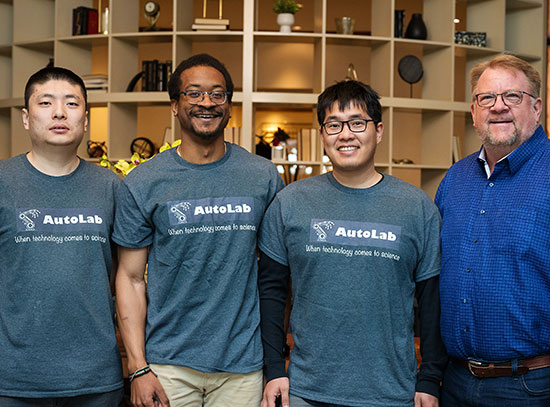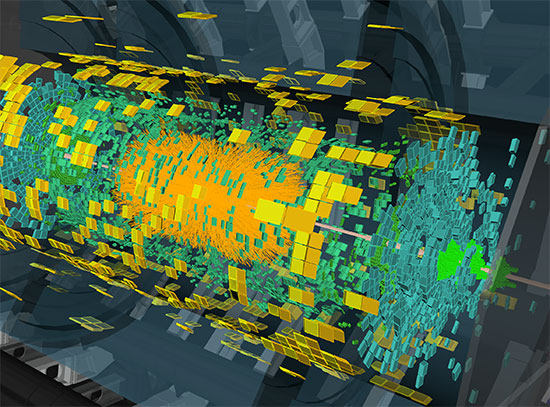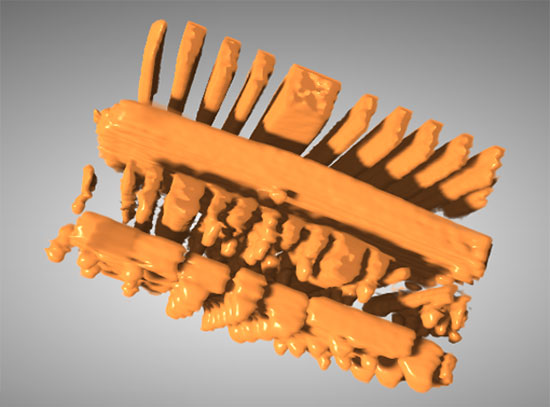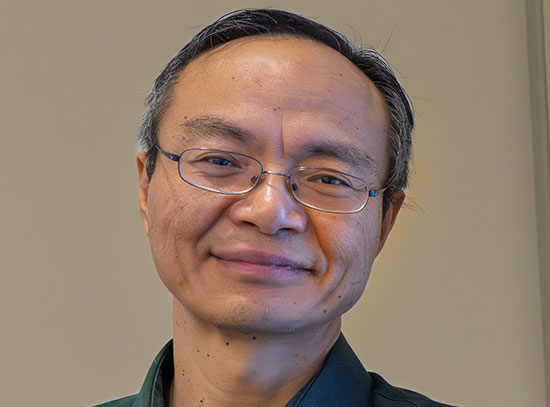ModSim 2023 Aimed to Realize the Benefits (and Risks) of Disruptive Technology
September 7, 2023
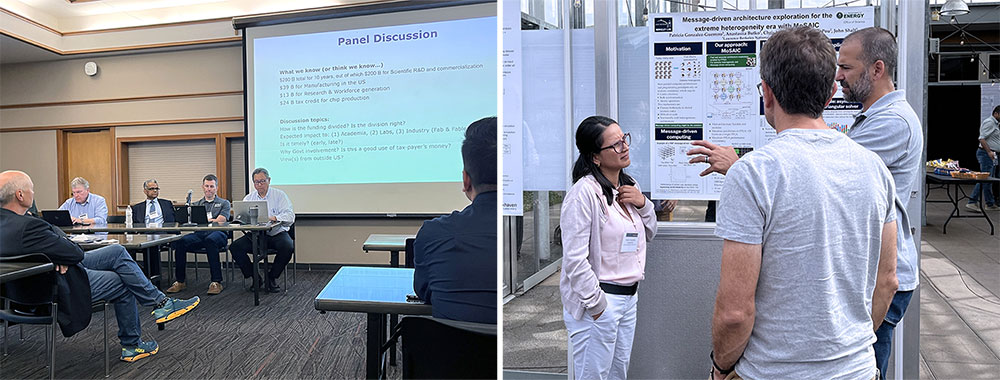 enlarge
enlarge
Left: The CHIPS and Science Act was a popular "disruption" topic at ModSim 2023. As Brookhaven Lab's Adolfy Hoisie looks on, panelists, including (l to r) Steve Pawlowski (Micron), Dev Shenoy (Office of the Under Secretary of Defense for Research and Engineering), Brad Beckmann (AMD), and James (Jim) Ang (Pacific Northwest National Laboratory), offered their perspectives during the discussion, CHIPS: Is it Real? Right: The Workshop on Modeling & Simulation of Systems and Applications has been a nexus for the ModSim community, where experts and next-generation researchers meet to showcase leading-edge technology and techniques.
The 12th annual Workshop on Modeling & Simulation of Systems and Applications, better known as ModSim 2023, made its usual trek to Seattle for another in-person meeting of the diverse ModSim research community. This time, attendees pondered the state of the field by focusing on the methods, tools, and technology driving change and innovation, which was captured by this year’s theme, ModSim for Disruptive Technologies.
One of the more interesting “disruptions” in computing research has come by way of the CHIPS and Science Act, a U.S. federal law passed in 2022 that is providing almost $280 billion to support domestic chip and semiconductor research/manufacturing. ModSim 2023 keynote speaker, Bob Colwell, previously Deputy Director of the Defense Advanced Research Projects Agency (DARPA), Director of the DARPA Microsystems Technology Office, and now an independent consultant, opened the workshop by addressing how the CHIPS law is forcing everyone involved in computer chip production and manufacture to bring every tool to bear as they seek to both innovate and expedite output in this country. He also explained how the ModSim community is poised to play an even more important role in that overall process.
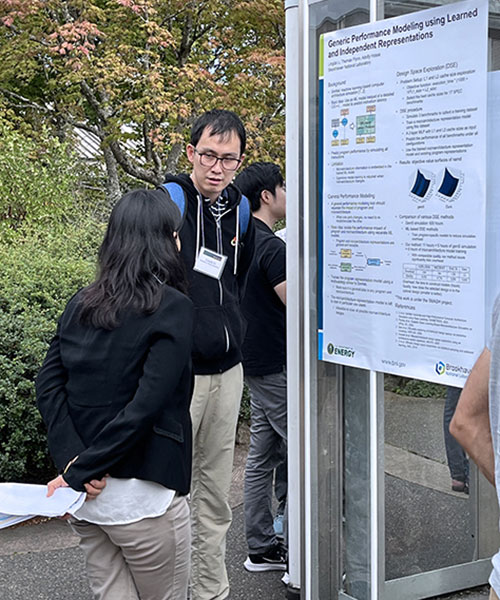 enlarge
enlarge
Lingda Li, a computer scientist with Brookhaven Lab's Computational Science Initiative, was among those who presented flash talks and posters during the ModSim 2023's Rapid Fire session. He focused on performance modeling and included details about SimNet, a machine-learning-based computer architecture simulation developed at Brookhaven Lab.
“Bob Colwell really set the stage for this year’s ModSim, providing back-of-house insight about the CHIPS program while emphasizing where modeling and simulation will likely be most essential as that program rolls on,” explained Adolfy Hoisie, Computing for National Security Chair with Brookhaven National Laboratory’s Computational Science Initiative, as well as the ModSim 2023 Organizing Committee Chair. “He provided a great lead for the days that followed with expert talks, panels, and new insights from active projects shared by some of the best up-and-coming ModSim researchers.” Since 2018, the U.S. Department of Energy’s Brookhaven National Laboratory has hosted the ModSim workshop.
In his talk, Day Two’s keynote speaker, Bill Harrod, a Program Manager at U.S. Intelligence Advanced Research Projects Activity (IARPA), addressed two other disruptive areas for ModSim: computer architectures (in Harrod’s case, for data-intensive applications) and codesign (where hardware and software are designed synchronously). Harrod detailed aspects of his Advanced Graphic Intelligence Logical Computing Environment, or AGILE, program at IARPA, which is using codesign to develop computing architectures that better manage data-intensive applications. ModSim is an essential element of the AGILE program as it is used to evaluate design performance when executing applications.
AI: Still Changing Things
Another high-tech disruption that showed little sign of slowing was artificial intelligence. In fact, several workshop attendees kept referring to AI as the “new world order.” In the past several years, AI and machine learning have been a centerpiece of ModSim research, spanning the entirely of the hardware/software stack. At this year’s workshop, the topic remained top of mind among research luminaries, from Associate Laboratory Director of Argonne National Lab’s Computing, Environment and Life Sciences Directorate, Rick Stevens, who highlighted the “mix” of AI, high-performance computing, and quantum computing on a post-exascale landscape, to Keren Bergman, Charles Batchelor Professor of Electrical Engineering and Faculty Director of the Columbia Nano Initiative at Columbia University, who explained how embedded silicon photonics can enable new architectures tailored to accelerate distributed machine learning applications. Meanwhile, Suma George Cardwell, from Sandia National Laboratories Center for Computing Research, provided an AI-centric look at neuromorphic computing architectures and related tools, such as ATHENA (Analytical Tool to Evaluate Heterogeneous Neuromorphic Architectures), which evaluates neuromorphic and analog dataflow accelerators to accelerate deep learning algorithms.
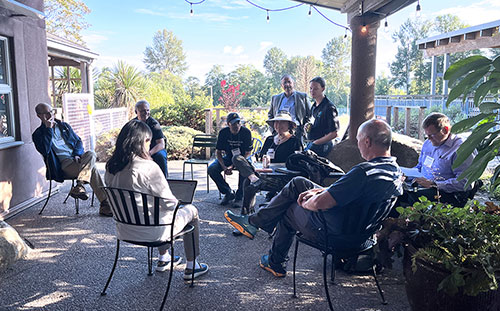 enlarge
enlarge
The University of Washington's Center for Urban Horticulture in Seattle has long been the host site for the annual ModSim workshop. Here, the Organizing Committee held an outdoor meeting to debate the merits of the Rapid Fire session presentations and determine who would receive the 2023 Sudha Award.
The industry outlook for AI and ModSim also was well represented with presentations and discussions, including a deeper look at how IBM is addressing hardware and software AI infrastructure to better develop and deploy Foundation Models or how workflows that feature digital twins and NVIDIA’s Omniverse will require many capabilities to be efficient, such as real-time simulation updates enabled by AI surrogate models. Microsoft also revealed how its DeepSpeed4Science initiative will partner with industry, academia, and federal research laboratories to enable new science-based system technologies that support large-scale discovery via models driven by machine learning. In addition, Justin Richter, a Senior Sustainability Impact Manager at Microsoft, introduced sustainability as new use for ModSim to the community by way of scalable modeling of cloud hardware digital twins using hybridized life cycle analysis.
“Hearing about the new initiatives and capabilities directly from those industry leaders, as well as others like DDN, HPE, and Qualcomm, and how ModSim is an indispensable part of those plans always is a key draw for this community,” Hoisie added. “It is a major reason this workshop continues to thrive.”
Next-Gen ModSim Research
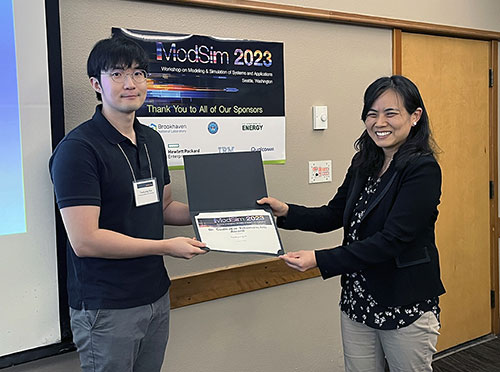 enlarge
enlarge
Home Team Win: Hyesoon Kim (right), a professor at Georgia Institute of Technology's College of Computing, presented the 2023 Dr. Sudhakar Yalamanchili Award to Taekyung Heo, a research engineer with Georgia Tech's Synergy Lab, for his work, Chakra: Advancing Benchmarking and Codesign with Standardized Workload Traces. The award honors the late Yalamanchili, who also was a popular computer science professor at the university.
Among its more recent traditions, ModSim 2023 also hosted its Rapid Fire session, which gave 15 early researchers the opportunity to showcase their novel ModSim research in a flash talk/poster session format. Since 2021, the Dr. Sudhakar Yalamanchili (Sudha) Award has been presented to the researcher whose presentation/poster demonstrated an “outstanding contribution” to modeling and simulation as featured during the workshop.
This year’s Sudha Award winner, Taekyung Heo, a research engineer from the Georgia Institute of Technology, impressed with his work, Chakra: Advancing Performance Benchmarking and Co-design using Standardized Execution Traces. Chakra provides open-source tools for performance modeling that standardizes execution traces with the goal of providing agile benchmarks and tools to drive future AI system codesign.
“After a dozen years, it is reassuring to see this workshop remains so relevant to the computing research community and that there still is room for ModSim to innovate at all levels of the hardware and software development pipelines,” Hoisie said. “I am pleased so many ModSim 2023 attendees were already looking forward to next year—our lucky number 13.”
For additional details about the 2023 Workshop on Modeling & Simulation of Systems and Applications, visit the meeting homepage.
Brookhaven National Laboratory is supported by the Office of Science of the U.S. Department of Energy. The Office of Science is the single largest supporter of basic research in the physical sciences in the United States and is working to address some of the most pressing challenges of our time. For more information, visit science.energy.gov.
Follow @BrookhavenLab on social media. Find us on Instagram, LinkedIn, Twitter, and Facebook.
2023-21428 | INT/EXT | Newsroom




